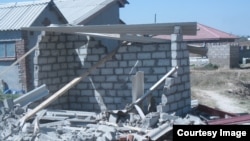Local authorities in Zimbabwe’s high density suburbs of Chitungwiza and Epworth demolished hundreds of structures, including houses and business premises in an early morning raid Friday leaving thousands of people homeless.
The Zimbabwe Republic Police anti-riot unit has been put on high alert and deployed to the two areas to crush any dissent as residents have vowed to resist the demolitions. The local authorities are claiming they have been instructed by the government to demolish "illegal structures."
More than 14000 residential stands allocated to home seekers in Chitungwiza and Manyame Rural district council are said to be illegal and the government says it will demolish them.
An audit report by the local government ministry in December last year says some of the stands were “created on spaces reserved for clinics, churches, schools, cemeteries, recreational activities and roads, while others were created under high voltage electricity pylons.”
The Chitungwiza Residents Trust or CHITREST in a statement Friday said the demolition exercise was “suspiciously carried out at around 0100 and 0200 hours, showing that this operation is illegal without any support of the laws of the country.”
The statement further says the operation started in Manyame Park in St. Mary's, Zengeza 5, Seke Units A, C, N, O, P and Riverside. This, the residents allege “comes against the court order granted by the Chitungwiza Magistrates court."
CHITREST director Marvellous Khumalo told VOA Studio 7 for Zimbabwe that they had since made a police report against the municipality for contempt of court. He said residents have also instructed the Zimbabwe Lawyers for Human Rights or ZLHR to seek recourse through an interdict from the High Court.
In May this year, Chitungwiza Provincial Magistrate Marehwanazvo Gofa interdicted the Chitungwiza Municipality and Glory to Glory Housing Cooperative from demolishing some residents’ houses.
Magistrate Gofa ruled that the inception of Section 76 of the new Constitution outlawed the actions of the urban council and local authorities who had illegally threatened to evict and demolish people’s properties. Gofa said no law should be "ultra vires the Constitution, which is the supreme law of the land."
In granting the interdict Magistrate Gofa prudently stopped the Chitungwiza Municipality and Glory to Glory Housing Cooperative from infringing on the residents’ right from arbitrary eviction or demolition of their houses without a valid court order as envisaged in Section 74 of the new Constitution.
Section 74 of the new Constitution states that: “No person may be evicted from their home, or have their home demolished, without an order of court made after considering all the relevant circumstances.”
ZLHR spokesman Kumbirai Mafunda told VOA Studio 7 that his organization has deployed lawyers in Chitungwiza and Epworth and are “working on litigation processes against the local municipalities.”
Mafunda who witnessed the demolitions in Epworth said representatives of the local authorities aided by armed policemen embarked on forced demolitions of several homes notwithstanding the fact that their actions are “illegal and unconstitutional.”
ZLHR says some residents have been arrested for taking pictures of the authorities executing the demolitions and others were picked up for allegedly assaulting some local authorities.
One of the victims of the Chitungwiza demolitions mother of two, Tsungai Munyengwa told VOA that council had promised to regularize their homes and she was shocked with the early morning raid. She says she does not know where to start and has been left heartbroken after investing a lot in the now demolished house.
But Local government minister Ignatius Chombo remained defiant saying government will demolish all illegal structures in cities and towns. Chombo also took a swipe at human rights lawyers for allegedly inciting people to intentionally break the law of the land.
The minister also told VOA that some residents affected by the demolitions will benefit from a scheme he launched today that will see government partner financial institutions to build over 300 000 houses in the next three years.
But residents and human rights lawyers scoffed at Chombo’s promises saying there is nothing new as he has been making similar claims for years without fulfiling them.
The latest demolitions are likely to cause serious concern at the United Nations after the world body took umbrage at a similar operation by Zimbabwe in 2005 dubbed Operation Murambatsvina or “Clean Out Garbage”.
The UN estimated that 700,000 people were made homeless or lost livelihoods as a result of the blitz on the informal homes and unlicensed vending of the largely urban poor.
A report by then UN-HABITAT Executive Director Anna Tibaijuka after a two-week fact-finding mission to Zimbabwe recommended that the evictions, "carried out in an indiscriminate and unjustified manner, with indifference to human suffering", be stopped.
But the government dismissed the UN's findings as biased. Chombo said then, the people had been evicted from illegal settlements, "and I don't think the UN can sanction illegality."




